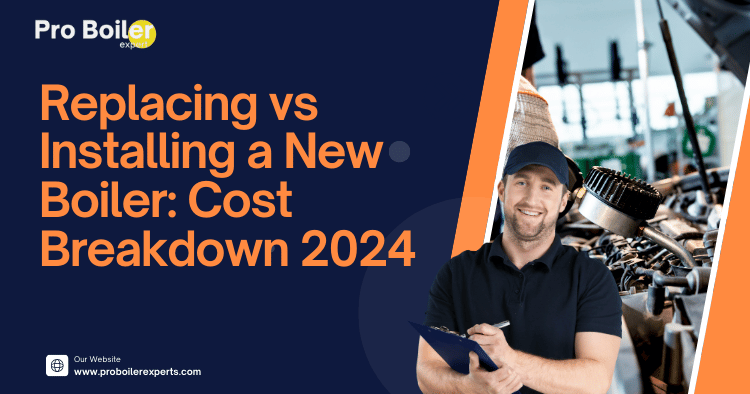Table of Contents
- Introduction
- Understanding the Difference: Replacement vs. Installation
- Factors Affecting Costs
- Cost Breakdown
- Benefits of Replacing vs. Installing
- Frequently Asked Questions
- Conclusion
Introduction
As we step into 2024, homeowners are increasingly evaluating their heating options, especially when considering the costs and benefits of replacing an old boiler versus installing a new one. With advancements in boiler technology and stricter energy efficiency regulations, this decision can significantly impact both your energy bills and overall comfort. This article provides a comprehensive breakdown of the costs associated with both replacement and new installation, helping you make an informed choice.
Understanding the Difference: Replacement vs. Installation
Replacement involves swapping out an old boiler for a new one of the same type and capacity. In contrast, installation refers to setting up an entirely new boiler system, which may require additional work, such as upgrading existing infrastructure or changing the type of heating system.
- Replacement: Generally less complex and quicker, particularly if you’re replacing a boiler with a similar model.
- Installation: Might involve more extensive modifications, but can provide long-term benefits, including improved efficiency and lower energy costs.
Understanding the difference between replacement and installation is crucial. A simple replacement may save you time and money, while an installation could offer better efficiency and comfort in the long run.
Factors Affecting Costs
Several factors can affect the overall cost of replacing or installing a boiler:
- Type of Boiler
Various boiler types come with different price points. For example, combination boilers (combi) are often less expensive than system or conventional boilers due to their compact design and efficiency. For a detailed comparison, check out the top 5 benefits of choosing combi boilers for your home. - Labor Costs
Labor costs can vary significantly based on location and the complexity of the job. Urban areas typically have higher labor rates compared to rural settings.Labor costs can be one of the most significant factors in the overall expense. Always get multiple quotes to ensure you’re getting a fair price.
- Energy Efficiency Ratings
Higher efficiency models often come with a higher upfront cost but can lead to significant savings on energy bills over time. Explore the top 5 high-efficiency boilers for optimal home comfort for more insights. - Additional Upgrades
New installations may require additional upgrades, such as new piping or electrical work, which can raise the overall cost. - Permits and Fees
Local regulations may require permits for installation or replacement, adding to the overall cost.Don’t overlook potential permits and fees! They can add up and should be factored into your total budget.
Cost Breakdown
Here’s a breakdown of the estimated costs for both scenarios:
| Cost Component | Replacing a Boiler | Installing a New Boiler |
|---|---|---|
| Boiler Unit Cost | $2,000 – $5,000 | $3,000 – $7,000 |
| Labor Costs | $500 – $1,500 | $1,000 – $2,500 |
| Additional Parts/Upgrades | $200 – $800 | $500 – $2,000 |
| Permits and Fees | $100 – $300 | $200 – $500 |
| Total Estimated Cost | $2,800 – $7,100 | $4,700 – $12,000 |
Note: Prices are estimates and can vary based on location and specific needs. Always consult a professional for precise quotes.
These cost estimates can help you plan your budget effectively. Remember, investing in a quality system now can save you money in repairs and energy costs later.
Benefits of Replacing vs. Installing
Replacing a Boiler
- Cost-Effective: Generally less expensive than new installations, especially if you are using a similar model.
- Less Disruption: The replacement process is usually quicker, minimizing disruption to your daily routine.
- Familiarity: You are already accustomed to how your existing system operates, making the transition smoother.
Choosing to replace your boiler can provide a seamless transition while keeping costs manageable.
Installing a New Boiler
- Improved Efficiency: Newer models typically offer better energy efficiency, potentially leading to significant savings on energy bills. For more information, see the top 5 benefits of condensing boilers you should know.
- Advanced Technology: New boilers often come equipped with modern technology, including smart thermostats and programmable features, which enhance control over your heating system.
- Long-Term Investment: While the initial costs are higher, a new boiler can provide a longer lifespan and fewer repair costs over time.
Investing in a new boiler is not just about immediate costs—consider the long-term savings and benefits that come with modern technology.
Frequently Asked Questions
1. How long does a boiler typically last?
Most boilers have a lifespan of about 10 to 15 years. Regular maintenance can help extend this lifespan.
2. Is it worth upgrading to a high-efficiency boiler?
If your current boiler is over 10 years old or has a low efficiency rating (below 80%), upgrading can be beneficial. High-efficiency boilers can save you up to 30% on energy costs.
Upgrading to a high-efficiency model can be a game-changer for your energy bills. Don’t hesitate to explore your options!
3. Can I install a new boiler myself?
While it is technically possible, it is not recommended. Boiler installation requires specialized knowledge to ensure safety and compliance with regulations. Always hire a certified professional.
4. What are the signs I need to replace my boiler?
Common signs include strange noises, irregular heating, increased energy bills, and frequent breakdowns.
Pay attention to your boiler’s performance. Early detection of issues can save you from costly repairs down the line.
Conclusion
Deciding between replacing your boiler or installing a new one involves careful consideration of costs, efficiency, and your long-term heating needs. By understanding the nuances of each option, you can make a more informed choice that fits your budget and enhances your home comfort.
For additional guidance, consider exploring resources such as the Energy Saving Trust or Which? to assist you in navigating your options.
By thoughtfully weighing these factors and understanding the related costs, you will be better equipped to make the best decision for your home heating needs. Happy heating!




